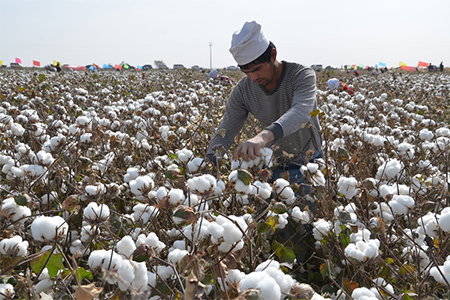

Xinjiang cotton labour force
Many human rights campaigners have asked US authorities to ban all imports of cotton from Xinjiang, a Chinese province. The campaign struck light after allegations of forced labor spread worldwide.
Substantial evidence of the Uighur community and other minor groups being forced into labor in cotton fields were submitted to the US custom and the Board of Protection.
China is known to be the world’s largest producer of cotton with over 84% of its cotton coming from Xinjiang, which is located in the north-west region of the country. With respect to the Chinese data, the petition apparel exports from the disputed region are valued at $4.2 billion in 2018.
Rahima Mahmut, a spokesperson of the World Uyghur Congress spreading the petition is hopeful that this ban could force Beijing to rethink its prison labor policies.
She stated that the measures taken by the campaigners for the ban were a very small measure when compared to the terrible abuse endured by the people of Uighur in Xinjiang. She is hopeful that this measure will hit the Chinese economy and force them to take action.
The campaign groups stated that since 2017, over a million Uighur Muslims have been moved to high-security camps, where they have been forced to produce industrial and agricultural goods for export.
The campaign is focused on boycotting products produced by Uighur forced labour. It also focuses on scrutinising companies who import cotton and other goods from Xinjiang to investigate their supply chains.
In July, an association of over 180 campaign groups issued a similar ‘call to action’ that questioned his-street brand’s involvement directly or indirectly in the abuses of the Uighur in China.
Cranston, business and human rights manager at human rights group and coalition member, Anti-Slavery International stated that having the entire fashion industry affected no brand can defend being complacent on the grave of the human rights crisis.
A spokesperson at the initiative stated that they were in the process of evaluating and will shortly announce an approach that prioritizes the safety and wellbeing of the farming community.
At CHINAPLAS 2025, BASF will highlight its leadership in polyurethane (PU) innovation with groundbreaking advancements in recycling technology.
Eurojersey has introduced digital printing to Sensitive Fabrics in the lingerie industry, offering an alternative to traditional decorative methods.
Fazilet Ceyhanlı, a research assistant at Çukurova University, has introduced a unique collection of designs made from "vegan leather" crafted…
Industrial Summit Technology introduced IMIDETEX, an innovative polyimide fiber designed to revolutionize composite materials.
Puma and RE&UP have partnered to strengthen circular textile solutions and convert textile waste into next-gen recycled cotton fibers and…
Lululemon has announced a multi-year partnership with biotechnology firm ZymoChem to advance the use of sustainable bio-based nylon in its…